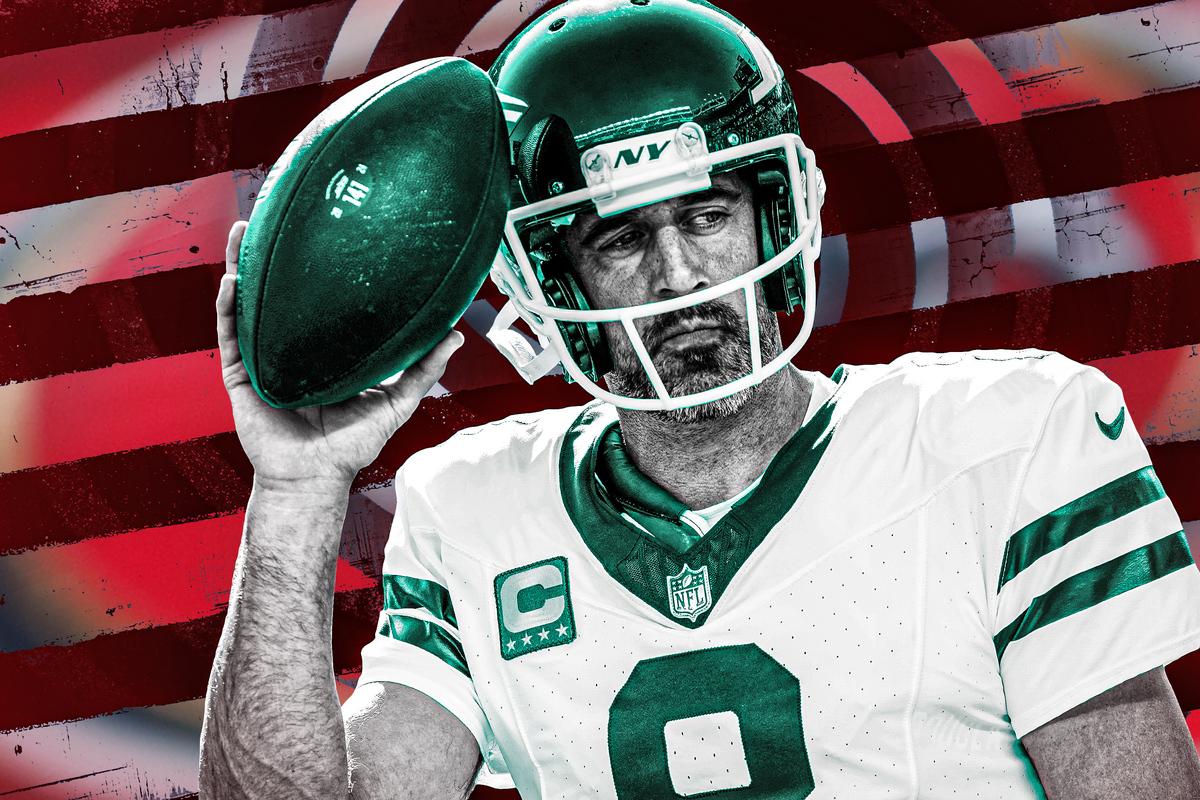
Let’s try this again. For the past 18 months, all we’ve gotten to do is talk about Aaron Rodgers on the New York Jets. From him joining the franchise via a trade from Green Bay in April 2023, to the outsize expectations of what was to come, to him running into last year’s opener on 9/11 with the American flag, to him injuring his Achilles just four plays into that first game, to the numerous segments on The Pat McAfee Show, to the trip to Egypt, to now, the saga has been long and ripe for discussion. “What was so disheartening and heartbreaking about last year was all the excitement around us,” Rodgers told ESPN about the 2023 season. “It was such a beautiful, beautiful night, and then I ended up playing fucking four plays.”
Finally, though, one year after Rodgers debuted for the Jets on Monday Night Football, we finally got to actually see Rodgers debut for the Jets on Monday Night Football. And in his first real performance for New York, Rodgers looked like everything Jets fans could have hoped for—the best quarterback they’ve seen in years. Unfortunately for them, though, the team around him still looks a ways away from competing for a Super Bowl—for now.
The Jets lost to the 49ers 32-19 on Monday night. Rodgers completed 13 of 21 passes for 167 yards before he was replaced by Tyrod Taylor in garbage time. The Jets got their asses kicked left, right, and center. But the silver lining is that Rodgers, the oldest active NFL player, has still got some juice.
In the most vintage Rodgers play this side of a Hail Mary, Rodgers caught the 49ers offside in the third quarter and did what he does best: beat them for a free-play touchdown with a 36-yard dart to Allen Lazard. Rodgers has 18 career passing touchdowns on free plays, more than anyone else in NFL history. The ball to Lazard had such a mesmerizing placement that anyone who watched Zach Wilson or Tim Boyle over the past few years could have only sat there in awe. The Jets haven’t seen anything like this since, well, Brett Favre.
It wasn’t all stellar pass plays and vintage Rodgers tosses, though. The offense’s first two plays of the night were rushes that gained a total of 7 yards, which set up Rodgers’s first pass of the season on third-and-3. Rodgers put the ball directly into a wide-open Lazard’s hands and … Lazard dropped it. Three-and-out. OK! No problem, Allen! Let’s try this again.
Rodgers’s second drive began on his fourth snap of the game. ESPN announcer Joe Buck noted that Rodgers made it only four snaps into last year’s debut before tearing his Achilles, but this time, Rodgers made it through, tossing a shovel pass to Breece Hall … who fumbled it away to the 49ers. It was just the second lost fumble by Hall since he debuted in the NFL in 2022. OK, Breece!! No problem!!!! Didn’t want to see Rodgers do anything anyway. Let’s try this again. Again.
On the ensuing drive, the Jets handed the ball off to Hall twice and got backed into a third-and-8. It felt like the team was playing a cruel joke on its fans, like they went through 18 months of buildup only to see Rodgers dink and dunk his way through a prime-time contest. Maybe this was actually a mass psychological experiment.
Then Rodgers took over. On third-and-8, Rodgers calmly approached the line of scrimmage, stared down the defense, and changed something about the play. He then backed up, took the snap, and whipped a back-shoulder pass to Garrett Wilson. First down.
The Jets ran the ball twice after that and managed just 3 yards, which set up a third-and-7. Rodgers went back to Wilson, this time over the middle with a sidearm throw. First down.
Later in the drive: another Breece run for 3 yards. Then another incompletion to Lazard. Then another third-and-7. Then another first down to Wilson. Wilson caught another ball after that for a second consecutive 8-yard gain, and Hall punched in the touchdown to give the Jets the 7-3 lead.
That run may not look like much, but it equaled as many carries as Hall had inside the 5-yard line over the entirety of last season (seriously). At over seven minutes long, that one Jets drive lasted longer than any drive they had all of last season (!). The Jets also managed three third-down conversions on that drive. They didn’t manage three third-down conversions in the first quarter of any game last year. In 2023, the Jets converted less than 32 percent of their red zone trips into touchdowns, the worst mark by any NFL team in nearly a dozen years. This year, with Rodgers under center, they are 1-for-1.
But that drive was the exception for the Jets, not the rule. The 49ers had the ball for 23 of the next 26 minutes of game time. And while the 49ers scored on eight straight drives, six of New York’s first seven drives ended in either a three-and-out, a turnover, or a kneel down to end the half. The Jets consistently backed themselves into third downs by running on first and second. And 50 minutes into the game, the 49ers had run more than twice as many plays as the Jets.
There were plenty of miscues for New York. Rodgers missed Wilson on a crucial fourth down midway through the fourth quarter. He also threw a pick on another pass intended for Wilson that wasn’t placed well. And Wilson didn’t get a second foot down on a potential catch near the sideline in the second half. Hall had a crucial fumble and drop. Wilson finished with six receptions on 11 targets for 60 yards, while Hall managed 16 carries for 54 yards plus another five catches for 39 yards.
There are the obvious holes in New York’s roster. Wilson and Hall are as good as any young running back–wide receiver combination in the NFL, but the Jets have no serious receiving options beyond them. At one point, Wilson had 46 yards of offense, Hall had 60, and the Jets combined had 100, which just about sums things up.
Lazard is a glorified blocker who has a $10 million salary this year. Tight end Tyler Conklin was a nonfactor on Monday night. The offensive line was unable to establish itself in the running game and got dominated by defensive tackle Javon Hargrave. The line was a huge issue last season, and it’s clearly still a work in progress—it’s made up of two 33-year-old tackles in Tyron Smith and Morgan Moses, plus left guard John Simpson, all of whom were acquired via trade or free agency this offseason. The unproven Joe Tippmann is starting at center, and 2024 first-round pick Olu Fashanu is waiting in the wings at tackle (though whether he’ll be ready to play on the same timeline as Rodgers is anyone’s guess). The Jets managed just 68 yards on 19 carries (3.6 yards per carry) on Monday; the 49ers managed 180 yards on 38 carries (4.7). The 49ers did that despite Christian McCaffrey missing the game as a late scratch and running back Jordan Mason taking 28 handoffs, which Buck gleefully mentioned is the most Mason has had since high school.
Last year’s Jets defense was one of the best in the league and also one of the healthiest, with most of its key players suiting up in 15-plus games. This year has been different. Linebacker C.J. Mosley was injured in the first half. Cornerback Sauce Gardner inexplicably missed a series in the first half too. Pass rusher Haason Reddick, who was brought in to replace Bryce Huff, has still not shown up to work this year in a bizarre contract holdout.
But truth be told, Rodgers’s teams have often started slow. He famously spelled out “R-E-L-A-X” after Green Bay got off to a rocky start in 2014, and then he led the Packers to the NFC championship game. In 2016, he promised that the Packers would run the table to make the playoffs, and they did. In 2021, a year in which Rodgers would go on to win MVP, Green Bay got blown out 38-3 by the Saints in Week 1. The Packers won their next seven games. So it’s fair to focus on the positives: This is the best Jets team we’ve seen in years. There’s a chance that Rodgers will be the second 4,000-yard passer in franchise history and maybe even lead the team to its first Super Bowl in half a century. Sure, the Jets still have a ways to go. But mostly, it’s just nice to watch Rodgers play again instead of hearing hypotheticals about it.


